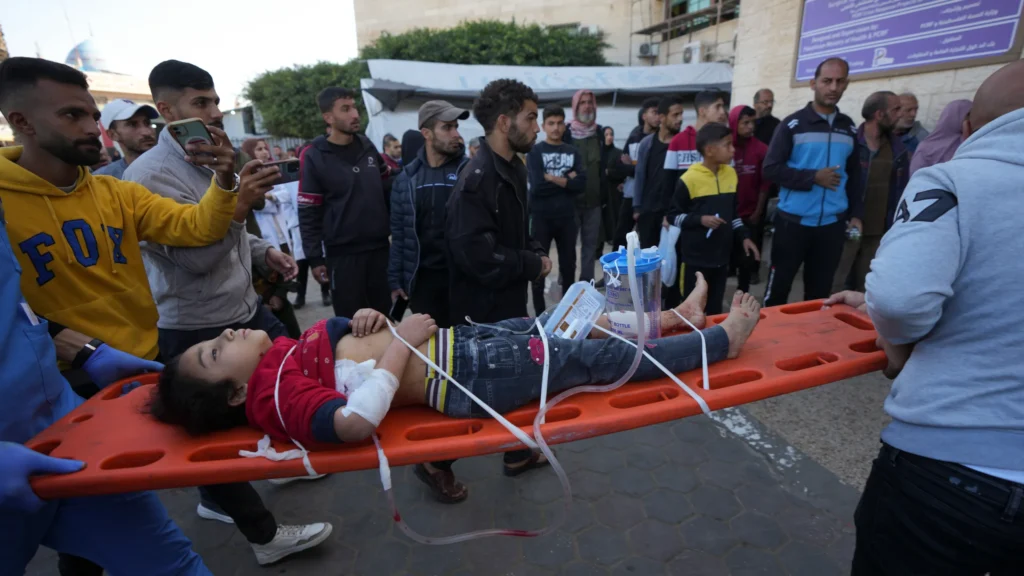GAZA CITY, Gaza Strip — Israeli airstrikes killed at least 48 people across the Gaza Strip, including women and children, on Tuesday night and into Wednesday, as Israel signaled a significant escalation in its months-long military campaign against Hamas. The new wave of attacks coincides with Israel’s approval of a sweeping plan to expand its operations in Gaza, now entering its 20th month.

Among the dead were 27 Palestinians killed in a strike on a school sheltering displaced families in Bureij, a densely populated refugee camp in central Gaza, according to officials at Al-Aqsa Hospital. The strike marked the fifth time the school had been hit since the conflict began. Flames lit up the night sky as plumes of smoke rose from the compound, while emergency crews rushed to rescue survivors from the wreckage. The dead included at least nine women and three children, hospital staff said.
Another 21 were killed in strikes elsewhere in Gaza, as the military assault intensified. The Israel Defense Forces did not immediately comment on the latest air raids but has repeatedly blamed Hamas for civilian deaths, accusing the group of operating from within civilian infrastructure such as schools.
The attacks come just days after Israeli leadership approved a phased plan to tighten its grip on Gaza. The strategy involves seizing additional territory, displacing civilians further south, taking control of aid distribution through private firms, and deploying tens of thousands of reserve troops. Israeli officials said the operation will not begin in full until after U.S. President Donald Trump concludes a scheduled regional visit later this month.
Israel already controls approximately half of Gaza and its proposed long-term hold on the enclave has raised concerns over the potential for military occupation. Questions remain about who would govern the territory if Hamas is dismantled, a goal Israel has yet to achieve despite 19 months of warfare.
The war erupted in October 2023 after a Hamas-led incursion into southern Israel killed 1,200 people and saw around 250 hostages taken. In response, Israel launched a sweeping offensive that Palestinian health officials say has now killed more than 52,000 people in Gaza, many of them civilians. The figures provided do not distinguish between militants and noncombatants.
The mounting civilian toll has reignited hostage concerns. On Tuesday, President Trump unsettled Israeli officials when he stated that only 21 of the remaining 59 hostages in Gaza are believed to be alive. Israel insists the number is 24, though an official acknowledged “serious concern” about three captives who have shown no signs of life. The families of those held have demanded full transparency from the government and called on Prime Minister Benjamin Netanyahu to halt the war until the hostages are released.
The Hostages and Missing Families Forum urged Israel to make their return the nation’s top priority. “This is the most urgent and important national mission,” the group said on X.
Since ending a cease-fire with Hamas in mid-March, Israel has pounded Gaza with relentless strikes and halted the flow of aid, exacerbating what aid groups call the worst humanitarian crisis since the conflict began. Mediation efforts led by Qatar and Egypt continue, but fundamental disagreements persist. Israel insists it will not end the war until Hamas’ rule and military capabilities are destroyed, while Hamas says it will release all hostages only in exchange for a permanent cease-fire and long-term truce.
Amid the preparations for escalation in Gaza, violence has also flared in the broader region. This week, Iranian-backed Houthi rebels in Yemen launched a ballistic missile that struck near Israel’s Ben Gurion Airport, prompting a two-day Israeli air campaign targeting sites including Sanaa International Airport.
While President Trump announced the suspension of a U.S.-led campaign against the Houthis after the group pledged to stop targeting American ships, the agreement does not cover Israeli interests. An Israeli official, speaking anonymously, said the deal came as a surprise and raised concerns about ongoing hostilities between Israel and the Houthis.
As the conflict deepens and regional tensions mount, Gaza faces another round of intensified warfare, with no clear end in sight.



